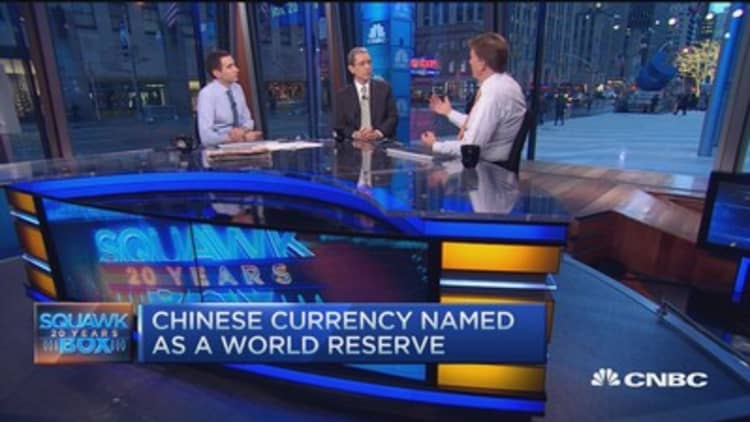The International Monetary Fund's decision to include the renminbi in its reserve currency basket is a major benchmark in China's push to internationalize its currency, but it could also be a sign of decline for the currencies it is replacing.
Starting in late 2016, the renminbi will make up about 11 percent of the basket that defines the value of IMF special drawing rights — a type of reserve asset that makes up a small but symbolic portion of overall currency reserves.
The basket determines the currency mix that countries receive when the IMF disburses financial aid. The decision to add the renmimbi, also known as the yuan, will likely increase demand for the currency.
The elevation of the renminbi means that other currencies in the basket will be losing some of their share — notably the euro, which will lose 6.5 percentage points, and the pound sterling, which will lose 3.2 percentage points.
The pound sterling was the leading world reserve currency from the 1870s until being surpassed by the U.S. dollar in the 1920s. In the SDR basket, the pound has hovered around 11 percent for several decades, actually gaining some ground to 11.3 percent in the 2010. According to IMF data, the currency now makes up only 4 or 5 percent of the world's official foreign exchange reserves.
The euro joined the SDR basket after its creation in 1999 as a replacement for the French franc and Deutsche mark, and gained ground to 37.4 percent in the 2010 IMF review. This reduction would be the first time the euro lost part of its share since joining the basket. It has also seen reductions in its overall foreign exchange holdings since 2010 — falling from around 27 percent to 20 percent in 2015.
Both currencies appeared to drop slightly relatively to the dollar after the IMF's announcement on Monday about the renminbi.
Read More IMF to include China's RMB in benchmark currency basket
Those changes are small, but a currency's status in the world's reserves can mean big gains for the home economy. Morgan Stanley expects as much as $2 trillion to flow into renminbi assets over the next 10 years as the currency takes on a larger international role.
To be sure, the country has a long way to go before it threatens the dollar — which still makes up about 60 percent of reserves and 42 percent of the SDR basket. Chinese markets are still far less open than much smaller international markets (like Norway), and further reforms could challenge the currency's growth as it is decoupled from the dollar.
Almost 40 central banks added the renminbi to their reserve funds between 2010 and 2014.
Some of those countries were apparently motivated by political desires to challenge the dollar as the dominant world currency. Given the rapid growth of the use of the renminbi in international trade and the speed at which currencies can be displaced on the world stage, it may be the dollar that will lose ground in the SDR basket in another five years.




